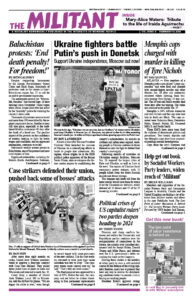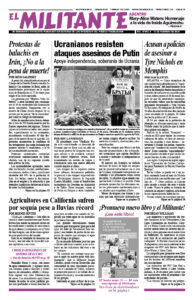The following tribute to Iraida Aguirrechu was delivered by Mary-Alice Waters during a brief ceremony on Jan. 11 at the Pantheon of Internationalist Combatants, located in the Colón Cemetery, Havana, Cuba, where Aguirrechu’s ashes are interred. Waters is the president of Pathfinder Press and a member of the National Committee of the Socialist Workers Party.
First of all I want to thank Balbina, Iraidita, Iraida’s entire family, and all who are here today. I thank you for the honor of being able to pay tribute to a revolutionary combatant with whom we had the privilege of working for the last decades of her life. Iraida was for us not only a trusted comrade. She became a close friend as well.
In a biographical note Iraida prepared a few years ago, she wrote:
For the last 30 years I have worked with the compañeros of the publishing house of the Socialist Workers Party of the United States. An official who was in charge of other political work with them asked me to help them on publishing matters. Judging by the results, this has been a success. We have published more than 35 titles outside of Cuba. I selected who would be interviewed and reviewed information being made public.
I remember well the first time I met Iraida. It was during the 1992 Havana International Book Fair. That was the first time Pathfinder Press had a stand in our own name at this important cultural festival. We hardly knew a soul back then. I felt like an orphan, wandering the floor of PabExpo, looking for someone to talk with.
When I passed by the stand of Editora Política (the publishing house of the Central Committee of the Communist Party of Cuba), a smiling woman waved and invited me in. She told me she had been asked to collaborate with Pathfinder on editorial matters and urged us to visit the Editora Política office when the book fair finished.
From that moment on, Iraida extended to us her invaluable help, not only on our publishing work but much more.
For the Socialist Workers Party and Pathfinder Press, the socialist revolution made by the workers and farmers of Cuba under the leadership of Fidel and the Rebel Army is one of the two great proletarian revolutions of the 20th century. It stands on the same plane as the October Revolution led by Lenin and the Bolshevik Party. That’s why workers and youth around the world seeking to emulate Cuba’s example need to be able to learn from your political course, and absorb the lessons of both your triumphs and errors.
For that, we need not only historical studies written by others. Above all we need the honest firsthand accounts of those who walked those often difficult paths themselves, leading others. As Raúl told combatants of the Rebel Army and veterans of Cuba’s internationalist missions more than a quarter century ago, “We have been able to make history, but not to write it.” And he urged them to get on with that task.
Pathfinder’s objective has always been to publish that history — in the words of those who made it — and in a form that makes it accessible around the world.
It was Iraida who opened the door for us to realize our shared objective. She was able to do it because of the respect and confidence she had earned over decades working with revolutionary combatants and leaders of the greatest courage and integrity.
One of the first she arranged for us to meet was José Ramón Fernandez, then vice president of the Council of Ministers, and known far and wide as the commander of the main column of troops that routed the U.S.-organized mercenary invasion force at Playa Girón on the Bay of Pigs in April 1961. Iraida had worked under him in numerous educational responsibilities. And her husband, Hermes Caballero, served as Fernández’s adjutant for more than 35 years.
Work with many other leaders expanded: Harry Villegas (Pombo), Armando Hart, Enrique Carreras, Néstor López Cuba, Teté Puebla, Víctor Dreke, Moisés Sío Wong, Gustavo Chui, Armando Choy, Asela de los Santos — to name only a few.
They generously worked with Pathfinder Press and had authorization from the highest levels of the Cuban leadership to do so because they trusted Iraida. And they knew she trusted us.
Working together over these 30 years, the total number of books born of that collaboration is even greater than Iraida noted. Today it’s some 61 and counting in seven languages, not only English and Spanish, but Farsi, French, Greek, Chinese, and Arabic.
This body of work stands as a monument to Iraida, one of her lasting contributions to Cuba’s socialist revolution, and a treasure that will continue to be mined by revolutionary workers and youth the world over.
We will miss her.

